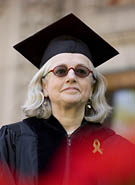Address by Susan V. Berresford
An unedited transcript of Commencement 2008 remarks by Susan V. Berresford, who received the honorary degree Doctor of Humane Letters.
 Thank you very much for this recognition and for this wonderful association with Bates, and for being part of the wonderful and distinguished group of people who are being honored today. And to you the graduating class, congratulations. You are a zesty and wonderful group and you are going to go on to great things, I know.
Thank you very much for this recognition and for this wonderful association with Bates, and for being part of the wonderful and distinguished group of people who are being honored today. And to you the graduating class, congratulations. You are a zesty and wonderful group and you are going to go on to great things, I know.
Many of you probably want to be or are already leaders. Of course not everybody has to be a leader and most people are not leaders all their lives, but in my view too few people try to be leaders. And I feel very strongly that we need more leaders who express empathy for those who suffer, leaders who promote democratic values, leaders who construct confidence- and trust-building measures that reduce strife, leaders who create opportunity systems that lift diverse people and leaders who are taking reasoned risks for very high returns.
My job at the Ford Foundation gave me the opportunity to meet leaders all around the world: old, young, rich, poor — all different kinds of communities. I came to see three qualities in them that I admired and contributed a great deal to their success. I hope you will ask yourselves, as you graduate and go on now, three questions that I think pertain particularly to their success as leaders.
The first question is, “Am I comfortable being different?” Leaders usually strive for something other than the status quo. They don’t just go along to get along. As the great civil rights leader John Lewis said, “Sometimes you have to get in the way.” So the first question is whether you are comfortable getting the way and being different.
The second question is, “Can I thrive in situations of ambiguity?” There are very few reform efforts in which the pathway for decision making and action is utterly clear. You need to be ready for confusion and uncertainty; in fact you have to like confusion and uncertainty and find opportunity in those moments.
The third question I hope you will ask is, “Do I enjoy managing struggles with generosity?” Leadership usually means you are trying to redistribute authority or power or influence in some way, taking it away from some group and giving it to another. Not many people who have power or authority give it up very easily. So the question is, can you enjoy that struggle and can you do it with generosity and sensitivity to those who are losing influence and losing power in the process. I think that is a very important skill.
I hope many of you will answer “yes” to these questions. I hope you will find in yourselves courage and candor, patience and persistence, grit and generosity, and I hope you will protect these qualities in yourselves because they are not always very valued. I hope you will recognize them in yourselves more and more, and foster them in others. We are counting on you to be the leaders of the future.
Thank you.